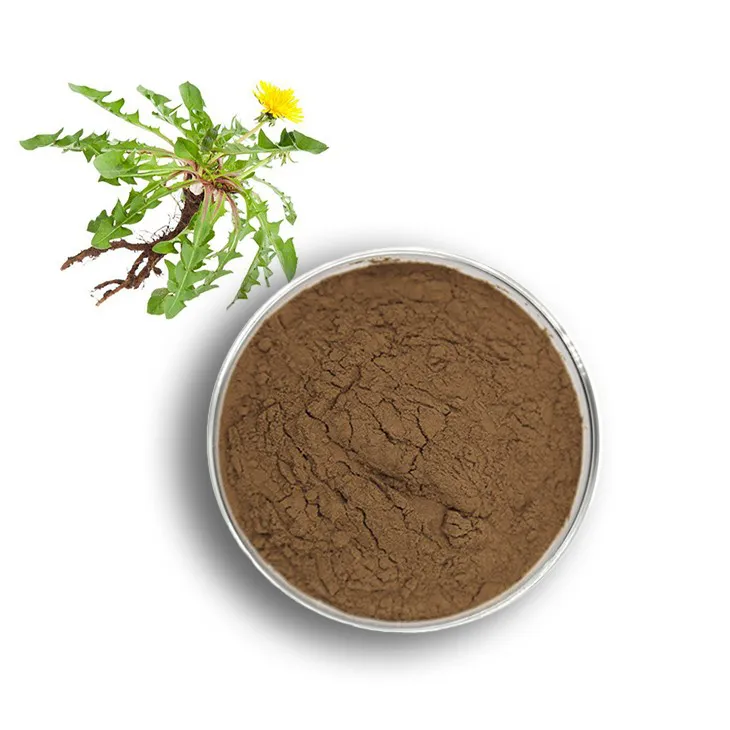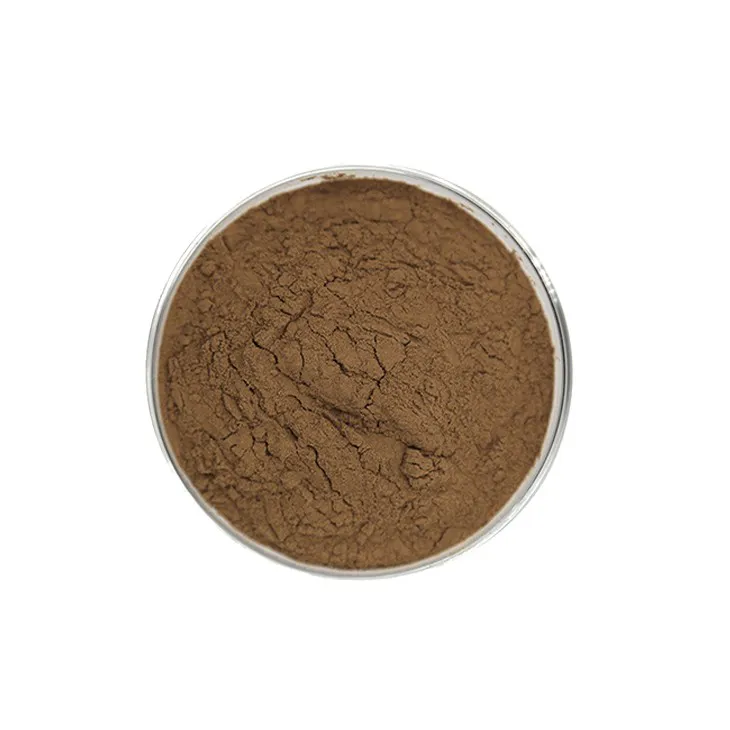- 0086-571-85302990
- sales@greenskybio.com
Active ingredients in dandelion root extract.
2024-12-01

Introduction
Dandelion (Taraxacum officinale) has been used in traditional medicine for centuries. Dandelion Root Extract is increasingly being studied for its potential health benefits. The active ingredients in Dandelion Root Extract play crucial roles in these potential health - promoting effects.

Phenolic Acids
Phenolic acids are one of the significant active ingredients in Dandelion Root Extract. These compounds are associated with antioxidant and anti - microbial activities.
Antioxidant Activity
- The antioxidant activity of phenolic acids in dandelion root extract is important for protecting cells from oxidative stress. Oxidative stress is caused by an imbalance between the production of reactive oxygen species (ROS) and the body's ability to detoxify them or repair the resulting damage.
- Phenolic acids can scavenge free radicals, which are highly reactive molecules that can damage cellular components such as DNA, proteins, and lipids. By neutralizing these free radicals, phenolic acids help prevent oxidative damage that can lead to various diseases, including cancer, cardiovascular diseases, and neurodegenerative disorders.
Anti - microbial Activity
- Phenolic acids also exhibit anti - microbial properties. They can inhibit the growth of various microorganisms, including bacteria, fungi, and viruses.
- For bacteria, phenolic acids may disrupt the cell membrane or interfere with bacterial metabolism. This can prevent the bacteria from multiplying and causing infections.
- In the case of fungi, the anti - fungal activity of phenolic acids may be related to their ability to interfere with fungal cell wall synthesis or disrupt fungal cell membrane integrity.

Sesquiterpene Lactones
The presence of sesquiterpene lactones gives dandelion root extract its characteristic bitter taste. These compounds have also attracted attention due to their potential anti - cancer properties as suggested by some studies.
Characteristic Bitter Taste
- The bitter taste of sesquiterpene lactones serves as a natural deterrent to herbivores in the wild. In human consumption, this bitterness can affect the palatability of dandelion root extract - based products.
- However, the bitter taste can also be an indicator of the presence of bioactive compounds, which may have beneficial effects on health.
Potential Anti - Cancer Properties
- Some studies have proposed that sesquiterpene lactones in dandelion root extract may have anti - cancer potential. These compounds may act on cancer cells in multiple ways.
- They could induce apoptosis, which is a programmed cell death process. Cancer cells often evade apoptosis, so substances that can trigger this process in cancer cells are of great interest in cancer research.
- Sesquiterpene lactones may also inhibit angiogenesis, the formation of new blood vessels that supply nutrients and oxygen to tumors. By blocking angiogenesis, the growth and spread of tumors can be restricted.
- Furthermore, they might interfere with the signaling pathways within cancer cells that are involved in cell proliferation and survival.

Vitamins and Minerals
Dandelion root extract contains various vitamins and minerals, such as vitamin C and potassium, which also contribute to its overall functionality in promoting health.
Vitamin C
- Vitamin C is a well - known antioxidant. It works in synergy with the phenolic acids in dandelion root extract to enhance the overall antioxidant capacity.
- It is also essential for collagen synthesis, which is important for maintaining the integrity of skin, blood vessels, and connective tissues.
- Vitamin C can boost the immune system, helping the body to defend against infections. It is involved in various immune functions, such as the production and function of white blood cells.
Potassium
- Potassium is an important mineral for maintaining proper heart function. It helps regulate the heart rhythm and can prevent abnormal heartbeats.
- It also plays a role in fluid balance in the body. Adequate potassium levels are necessary for proper nerve function, muscle contraction, and the transport of nutrients into cells.
- In the context of dandelion root extract, the potassium content can contribute to the overall health - promoting effects, especially for individuals with potassium - deficiency - related health issues.
Other Bioactive Compounds
Besides phenolic acids, sesquiterpene lactones, vitamins, and minerals, dandelion root extract may contain other bioactive compounds that are still being investigated.
Polysaccharides
- Polysaccharides are large carbohydrate molecules. In dandelion root extract, they may have immunomodulatory effects.
- They could stimulate the immune system by enhancing the activity of immune cells, such as macrophages and lymphocytes.
- Some polysaccharides may also have prebiotic properties, promoting the growth of beneficial gut bacteria. A healthy gut microbiota is associated with improved digestion, enhanced immune function, and even mental health.
Flavonoids
- Although the flavonoid content in dandelion root extract may not be as well - studied as other components, flavonoids are generally known for their antioxidant, anti - inflammatory, and anti - microbial properties.
- They can help reduce inflammation in the body, which is a common underlying factor in many chronic diseases, such as arthritis, diabetes, and heart disease.
- Flavonoids may also interact with other bioactive compounds in dandelion root extract to produce synergistic effects on health.
Conclusion
In conclusion, dandelion root extract contains a variety of active ingredients, including phenolic acids, sesquiterpene lactones, vitamins, minerals, polysaccharides, and potentially flavonoids. These components contribute to its antioxidant, anti - microbial, anti - cancer, immunomodulatory, and other health - promoting properties. However, more research is needed to fully understand the mechanisms of action of these active ingredients and to determine the optimal use of dandelion root extract in promoting human health.
FAQ:
What are the main active ingredients in dandelion root extract?
The main active ingredients in dandelion root extract include phenolic acids, sesquiterpene lactones, vitamins (such as vitamin C), and minerals (such as potassium).
How do phenolic acids in dandelion root extract contribute to health?
Phenolic acids in dandelion root extract are associated with antioxidant and anti - microbial activities, which can help protect the body from oxidative stress and harmful microorganisms.
What role do sesquiterpene lactones play in dandelion root extract?
Sesquiterpene lactones give dandelion root extract its characteristic bitter taste and may have anti - cancer potential as some studies have suggested.
Are the vitamins in dandelion root extract important?
Yes, the vitamins in dandelion root extract, such as vitamin C, are important. They contribute to the overall functionality of the extract in promoting health.
How do the minerals in dandelion root extract affect health?
The minerals in dandelion root extract, like potassium, contribute to its overall functionality in promoting health, although specific effects may vary depending on various factors.
Related literature
- The Bioactive Compounds and Potential Health Benefits of Dandelion (Taraxacum officinale)"
- "Dandelion Root Extract: Composition, Pharmacological Activities, and Therapeutic Applications"
- ▶ Hesperidin
- ▶ Citrus Bioflavonoids
- ▶ Plant Extract
- ▶ lycopene
- ▶ Diosmin
- ▶ Grape seed extract
- ▶ Sea buckthorn Juice Powder
- ▶ Fruit Juice Powder
- ▶ Hops Extract
- ▶ Artichoke Extract
- ▶ Mushroom extract
- ▶ Astaxanthin
- ▶ Green Tea Extract
- ▶ Curcumin
- ▶ Horse Chestnut Extract
- ▶ Other Product
- ▶ Boswellia Serrata Extract
- ▶ Resveratrol
- ▶ Marigold Extract
- ▶ Grape Leaf Extract
- ▶ New Product
- ▶ Aminolevulinic acid
- ▶ Cranberry Extract
- ▶ Red Yeast Rice
- ▶ Red Wine Extract
-
melatonin extract
2024-12-01
-
Saw Palmetto Extract
2024-12-01
-
Soy Extract
2024-12-01
-
Shikone Extract
2024-12-01
-
Eyebright Extract
2024-12-01
-
Ginger Extract
2024-12-01
-
Ginseng Root Extract
2024-12-01
-
Garcinia Cambogia Extract
2024-12-01
-
Astaxanthin
2024-12-01
-
Reishi mushroom extract
2024-12-01





















